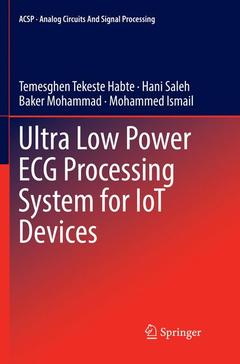Description
Ultra Low Power ECG Processing System for IoT Devices, Softcover reprint of the original 1st ed. 2019
Analog Circuits and Signal Processing Series
Authors: Tekeste Habte Temesghen, Saleh Hani, Mohammad Baker, Ismail Mohammed
Language: English
Subjects for Ultra Low Power ECG Processing System for IoT Devices:
Approximative price 52.74 €
In Print (Delivery period: 15 days).
Add to cartPublication date: 12-2018
Support: Print on demand
52.74 €
In Print (Delivery period: 15 days).
Add to cartPublication date: 09-2018
Support: Print on demand
Description
/li>Contents
/li>Biography
/li>Comment
/li>
?This book describes an ECG processing architecture that guides biomedical SoC developers, from theory to implementation and testing. The authors provide complete coverage of the digital circuit implementation of an ultra-low power biomedical SoC, comprised of a detailed description of an ECG processor implemented and fabricated on chip. Coverage also includes the challenges and tradeoffs of designing ECG processors.
- Describes digital circuit architecture for implementing ECG processing algorithms on chip;
- Includes coverage of signal processing techniques for ECG processing;
- Features ultra-low power circuit design techniques;
- Enables design of ECG processing architectures and their respective on-chip implementation.
Chapter 1. Introduction.- Chapter 2. IoT for Healthcare.- Chapter 3.Background on ECG Processing.- Chapter 4.Combined CLT and DWT Based ECG Feature Extractor.- Chapter 5.ACLT based QRS Detection and ECG Compression Architecture.- Chapter 6. Ultra-Low Power CAN Detection and VA prediction.
TTemesghen Tekeste received the B.S. degree in electrical engineering from Asmara University, Eritrea, in 2007, and the M.S. degree in microsystems engineering from the Masdar Institute of Science and Technology, Abu Dhabi, in 2012, with a focus on low-power, mixed signal integrated circuit design that involved schematic design, simulation, layout, and verification of an ultra-low power clock generator for heart rate sensor IC. He received his Ph.D. from Khalifa University, Abu Dhabi, United Arab Emirates in 2018, where he researched on ultra-low power digital circuit design for biomedical application.. In 2006, he joined the Eritrea Institute of Technology, Asmara, as a Teaching Assistant and a Lab Instructor. He holds two issued U.S. patents, and has authored journal and conference papers. His research interest includes DSP hardware design, computer architecture, ASIC chip design, and FPGA design.
Hani Saleh is an associate professor of electronic engineering at Khalifa University since Jan, 2012. He is an a co-founder and an active member in KSRC (Khalifa University Research Center) where he leads a project for the development of wearable blood glucose monitor SOC and a mobile surveillance SOC and safe exercise monitoring device. Hani published over 100 articles in peer-reviewed journals and conferences, he has 15 issued US patents and 5 pending patent applications. Hani has a close to 19 years of industrial experience in ASIC chip design, microprocessor design, DSP core design, graphics core design and embedded system design. His experience spans DSP core design, microprocessor peripherals design, microprocessors and graphics core deign. Prior to joining Khalifa University he worked as a Senior Chip Designer (Technical Lead) at Apple incorporation; where he worked on the design and implementation of Apple next generation graphics cores for its mobile products (iPad, iPhone, …etc.), prior to
Describes digital circuit architecture for implementing ECG processing algorithms on chip
Includes coverage of signal processing techniques for ECG processing
Features ultra-low power circuit design techniques
Enables design of ECG processing architectures and their respective on-chip implementation




